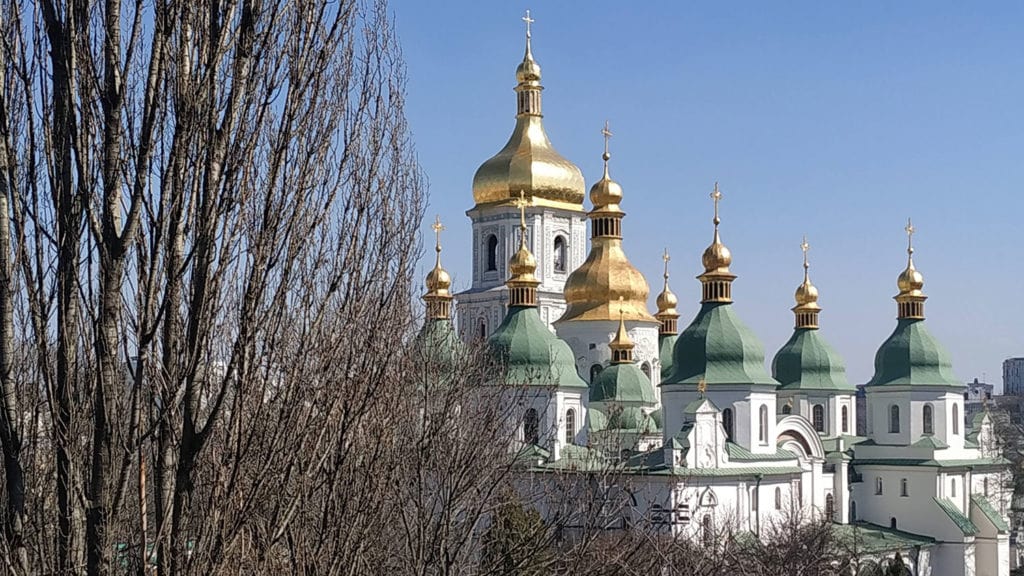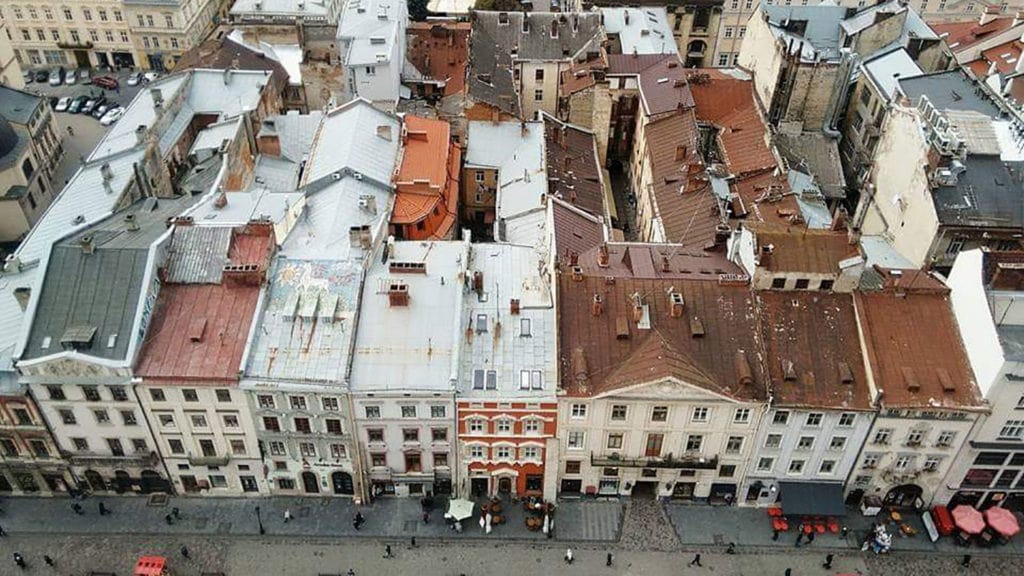A Telecommuter's Guide to the Galaxy: Ukraine
It’s a modern irony that Europe’s largest country is also one of its most overlooked by Western tourists. But that’s finally beginning to change. Its low cost of living, progressively-minded youth, lightning-quick internet speeds, and pulsing counterculture are drawing the attention of remote workers. It may not have all the Instagram beaches of Bali and Thailand, but a solid digital infrastructure and low-cost connections to the rest of Europe make Ukraine an attractive hub for digital nomads.
To visit Ukraine is to visit a massive country undergoing a massive transition. In 2014, Ukraine held a protest similar to Occupy Wall Street, with a few key differences: it was much colder, the government fired on the crowd with high-powered sniper rifles, and the protesters, miraculously, won.
Breaking with hundreds of years of oppressive history by pivoting away from Russia and towards the European Union, Ukraine is carving its own unique path. You’ll still find many remnants of the past (brutalist Soviet architecture and Tsar-era flats), but you’ll also see signs of the future (a booming IT sector and growing LGBTQ acceptance). The Russian government would understandably prefer that its tourists not see this alternate reality unfolding in neighboring countries like Ukraine. Because to visit Ukraine is to actively support the independence of a nation fighting for modern, progressive values.
Politics may make the international headlines, but you’d be forgiven for forgetting they exist once entering Ukraine. Modern cafes, exotic restaurants, and a thriving expat culture will have you drawing comparisons to Krakow, Prague, and Berlin. The internet’s fast, the prices are cheap, and the locals are inviting to Westerners. A contagious and youthful energy courses through the main cities, drawn from the contrasting forces of East and West. For a remote worker, Ukraine ticks all the boxes, and then some. Welcome to the land on the edge.
Practicalities of Getting Set Up in Ukraine
Visa
Citizens of the US and the EU do not need a visa to enter Ukraine and may stay for up to 90 days every 180 days. This mirrors the state of affairs in Europe’s Schengen Zone, but, critically, does not overlap—meaning a remote worker could feasibly stay on the European continent year-round by bouncing between Ukraine and the Schengen Zone.
Getting Around
Don’t worry about hailing taxis and using Google Translate to negotiate the fares. Uber is widely available in the major cities and at the major airports. Once inside the city itself, an Uber ride is unlikely to cost more than a few dollars. There’s also an efficient metro (which costs mere pennies), but you might be more inclined to walk down the very pedestrian-friendly streets. Trains are the best way to move between cities: the fast trains are modern and comfortable, while the overnight sleeper trains trade speed for Soviet charm.
Internet
You can get a no-contract 4G SIM card with unlimited internet for $5 a month. While the provider does throttle users once they go over 3 GB in a day, this isn’t really a problem in practice, even for those working in high data volumes. The average cafe, restaurant, and coworking space has fast and reliable WiFi, and it’s extremely uncommon to find a connection that’s less than 20mbps—something that would be unthinkable in other remote hubs like Chiang Mai and Bali.
Finances
The sad reality for the people of Ukraine is that the average salary is around $300 a month. The bittersweet flipside of this is that most remote workers instantly join a slice of high society the second they step foot in the country. But don’t be fooled by the numbers: you’ll still see Porsche SUVs, trays of caviar, and lots of high-end fashion. This economic disparity can and does divide people, so try to be sensitive to it. You can spend as much or as little as you want in Ukraine, but, practically speaking, the average digital nomad will struggle to spend more than $50 a day.
Housing
When first arriving in Ukraine, checking into a large hostel or a shared space is generally a good idea. Dream House, for example, has two large locations in two different cities and they offer both shared and private rooms, along with a plethora of optional activities. In places like this, you won’t encounter many language barriers and you’ll also meet a wide network of travelers, expats, and locals who know how to navigate the city and its neighborhoods. After a week, you should be able to determine whether you want to search out your own long-term apartment or check out another city first. Month-long stays with English-speaking landlords are hard to come by in Ukraine and Airbnb is currently the best option. The renters in this market, however, know about their quasi-monopoly, and they know that long-term English speakers can afford to pay more. As a result, your housing costs are likely to be your biggest expense in the country.
Language
Language is a sensitive issue in Ukraine, and one that’s exacerbated by the ongoing conflict with Russia. In the West, you’ll generally hear people speaking Ukrainian. In the South and East, you’ll generally hear people speaking Russian. In the center (Kyiv), you’ll hear a mix of both. To some Ukrainians, the issue of language is fiercely political. But if you’re the average Westerner, you’re unlikely to even know the difference between Russian and Ukrainian. So how difficult is it for an English speaker?
Most Ukrainians under 30 have at least a working knowledge of English, especially in the capital city, and the number of English speakers grows every year. Sometimes your accent (yes, you have an accent) can complicate matters, but a little patience and thoughtfulness on both sides can go a long way.
It’s also helpful to understand some seemingly small issues in English that Ukrainians can take seriously. For example, don’t refer to Ukraine as the Ukraine (the latter can imply that Ukraine is simply a region, rather than a sovereign country). And, when sending texts to your new Ukrainian friends, try to call Kyiv by its Ukrainian name, Kyiv, rather than its Russianized name, Kiev. When speaking with locals, try to ask more questions than they do. You have a lot to learn, and people have a lot of experiences to share with you.
If you feel ambitious, Duolingo can teach you the basics of Ukrainian or Russian in just a few weeks. Don’t underestimate the power of a simple please or thank you. As a foreigner, no one is likely to harp on you for speaking Russian over Ukrainian, or vice versa, and they’ll probably be more amused by your attempts than anything else. No matter how much you’ve prepared though, if you go outside of the bigger cities, or even into any local mom-and-pop shops in the capital, you will encounter some blank stares. Just roll with it, and remember to smile.
Four Spots for Telecommuters in Ukraine
Live the Big City Life in Kyiv

Kyiv is the heart of Ukraine—both physically and literally. Served by two international airports, it’s your most likely entry point into the country. Once a jewel of the Soviet Union, Kyiv is home to huge buildings, a thumping nightlife, and a major arts scene. A large expat population means you’ll have no problem finding meaty English conversations and a slew of hip restaurants means you might put on a few pounds in the process.
On the weekends, you can contentedly tire yourself out walking from sight to sight: the Rodina Mat, the Dnipro River, Maidan, Hydropark, and any number of exquisite churches. At night, you can go for a stroll with locals and students in Taras Shevchenko Park, catch some classical ballet, or head over to the techno temple of Closer, rated as one of the best clubs in the world.
Day to day, this is the capital of the country’s business and IT sectors, and it comes with glistening coworking spaces (Underhub and Platforma). But you might not need them: Kyivians have a supreme sense of style and you might end up plunking down at different cafes in neighborhoods like Podil or Golden Gate, just to take in the aesthetics as you work.
Find the Hidden Gems of Lviv

Located in the far west of Ukraine, near the Polish border, Lviv is a major change of pace and style from the country’s capital. It’s here that you’ll find a serious commitment to all things Ukrainian: from the language, to the dress, to the food, to the architecture. The pedestrian-only city center is a UNESCO Heritage Site, with the sounds of cars replaced with musicians and opera singers.
It’s easy to see Lviv as a typical European city, with its heavy coffee culture and cobblestone streets, but the real quirks of Lviv are playfully hidden. Top restaurants sit behind unmarked doors in quotidian-looking apartment blocks. Speakeasys in cellars require passwords (Slava Ukraina!). But the overriding ethos here isn’t exclusion; it’s self-awareness. These places poke fun at—and celebrate—the city’s past: both as a fixture in the resistance movement, and as the birthplace of the concept of sadomasochism. Get into some walking tours on your time off to get a sense of what’s behind those doors you’d otherwise stroll past.
Be the Flashy Tourist in Odessa

Once referred to as the “Pearl of the Black Sea,” Odessa’s image isn’t quite as twinkling as it once was, but it’s still a popular vacation destination for Ukrainians and foreigners alike. Located near the Moldovan border, Odessa primarily caters to tourists, and, as such, lends itself to a slightly more divided social atmosphere.
But if you crave a view of the coast while in Ukraine, Odessa has it, along with plenty of Instagrammable urban sights. While most people go there to party and relax, remote workers do have a few good coworking options, like Impact Hub. Solid cafe and restaurant options abound in the city center, which revolves around the Odessa Opera House. And if you ever get the urge to join the tourist hordes, you can grab an Uber to the tourist-centric Arcadia Beach for about $5, and you’ll be there in 20 minutes.
Shut Up and Work in Kharkiv
Once the capital of the Ukrainian Soviet Socialist Republic, Kharkiv doesn’t make it onto many people’s itineraries. Located in the far northeast of the country, about 40 kilometers from the Russian border, Kharkiv (perhaps) has retained more of its Soviet past than any other Ukranian city. English is rarer here than in any of the cities listed above, but the prices are also significantly lower, making it an excellent place to shut out the distractions and simply get your work done.
The Assumption Cathedral and the Annunciation Cathedral lend this industrial city a bit of spiritual grandiosity and give you something to look at on your commute to and from work. And while it does lack some of the aesthetic and openness of other Ukrainian cities, Kharkiv may have Ukraine’s best coworking space: Fabrika, a four-floor factory from 1933 that’s been converted into a bar, event center, and shared office. Making connections with the locals is difficult, but not impossible. The ones you do meet will likely be mystified as to why you’re even there.
A Vacation From Your Vacation
When considering side trips within the country, you have a few options: the Carpathian Mountains in the west, the castles in central Ukraine, the Black Sea in the south, or the spooky relics of Chernobyl in the north. But when it comes to intra-country travel, Ukraine isn’t as spoilt for choice as some other destinations.
The good news is that flights from Ukraine to other European cities are extremely cheap. Since pivoting towards the West in 2014, Ukrainians have earned the right to visa-free travel within the EU and low-cost carriers have stepped in to fill that need. For the same price as a flight from LA to Las Vegas, you can see Berlin, Prague, Budapest, or Krakow from Kyiv. Some Ukrainians are now getting to visit the EU for the first time, just as many Westerners are now moving in the other direction. This mutual cultural exchange is a critical step on Ukraine’s path towards a brighter, more progressive future.
Whether you’re considering Ukraine as a hub for remote work, or you’re just curious about this dynamic land on the edge, go ahead and take a chance. Buy a ticket. You might find yourself coming back again and again.


